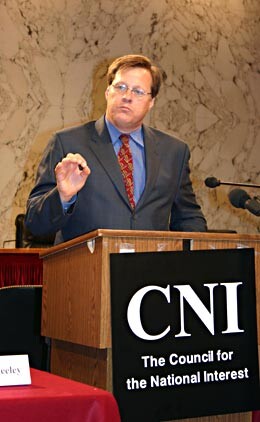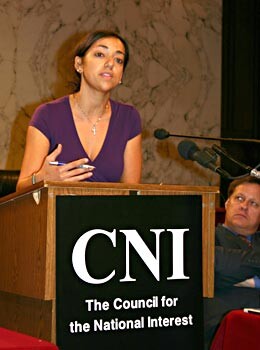Council for the National Interest 29 September 2005
A REPORT ON THE CNI PUBLIC HEARING ON CAPITOL HILL

Kevin Zeese, Director of Democracy Rising and a candidate for U.S Senate in Maryland. (Photo: CNI)
Bennis addressed the question of how the United States plays a direct role in both. In Iraq, it is as the major occupier. In Palestine, the role resembles that of the “enabler,” the power than allows Israel to carry out its occupation. For a more direct link, she pointed out the role that Jenin played both occupations, and how the U.S. military experts learned the “right” occupation techniques from Israel’s brutal destruction of the refugee camps.
“Israel is the largest recipient of U.S financial aid in the world, receiving a staggering $14 million per day for the last 25 years,” Zeese noted. Yet while it has given Israel more aid than it has to the entire continent of Africa, the U.S. does not control the relationship. In fact, the reverse is true, Zeese claimed, with Israeli leaders often in the driver’s seat.
Nor has the “special relationship” between the U.S. and Israel for more than fifty years brought a viable peace agreement between Israel and Palestine. “A viable Palestinian state is the basis of peace,” Zeese said.
The occupations of Iraq and Palestine have not made the world safer, Zeese argued. “Iraq has replaced Afghanistan as the number one place to train terrorists” according to CIA reports. Thus, despite the large number of casualties and an enormous expense, the war on terrorism has made economic conditions for Americans worse, not better, while extending the scope of the war. Bombs are now being directed at European capitals, with a great loss of civilians

Huwaida Arraf, co-founder of the International Solidarity Movement. (Photo: CNI)
She provided the example of several youth organizations that have tried to save the olive trees in the village of Shuqba, which, along with its fig trees, have been the main source of income for the farmers and their families. “This isolated and confiscated land,” she pointed out, “was the only income for one farmer named Sadaat and his family of thirty. He witnessed his land being destroyed and the trees uprooted with his eyes. Now he witnesses his family’s hunger and suffering because of the Apartheid Wall and the Jewish-only bypass roads.”
Elsewhere in the occupied West Bank, the Apartheid Wall prevents farmers from gaining access to their fields. In some areas, only a single gate provides access, and the posted times are not often kept. Farmers must wait hours to get to their fields, she said, and sometimes they are forbidden access for days.
Arraf also leveled complaints about the bias in the national media in covering Israel/Palestine events. “It reports the acts of violence against Israelis but never mentions the illegal acts on the Palestinians and the militants fighting for peace on both sides.”
Nor do most people realize the strength of the peace movement in Israel. “Two-thirds of Israelis want a two-state solution,” Arraf said, adding, that many “are now ready to support Palestine.” She quoted from the statement of the Refuseniks, the Israeli soldiers who have refused to serve in the West Bank: “We, who know that the Territories are not a part of Israel, and that all settlements are bound to be evacuated, hereby declare that we shall not continue to fight this War of the Settlements. We shall not continue to fight beyond the 1967 borders in order to dominate, expel, starve and humiliate an entire people… We shall continue serving the Israel Defense Force in any mission that serves Israel’s defense.”
Bennis took up the question of military occupation under international conventions and the rules governing the U.S. Arms Export Act, both of which Israel has repeatedly violated. She reminded the audience that under international law, “occupation is supposed to be temporary. The occupiers are supposed to provide food, energy, even recreation.” Yet the Israeli occupation of the Palestinian Territories is now in its 38th year.
Israelis are also violating U.S. laws, specifically the terms of the Arms Export Act. “Arms exported abroad aren’t supposed to be used except in self defense, certainly not in war or on people,” Bennis said. “Israel violates the arm export act when it uses F-16s to bomb and assassinate Hamas officials in Gaza and the West Bank.”
All speakers agreed that that United States needs to own up to its responsibilities. According to Zeese, 83% of the American people feel misrepresented by their own government. “It is a key moment and the media has to change in order to show the problems of United States’ foreign policy. It also takes the courage to challenge power - we have to challenge the government.” Bennis added, “The main key is education.” Arraf insisted, “We must let the government officials know what we want and increase the pressure on our congressmen.”
The Council for the National Interest is a non-profit, non-partisan grassroots organization advocating a new direction for U.S. Middle East policy. As CNI Founding Chairman Paul Findley notes, CNI is “motivated by the national interest of our country in Middle East policy… CNI provides a way for all citizens, regardless of religious affiliation or national origin, to speak out in an effective way. Those who participate can help advance the national interest in the Middle East and at the same time help repair the damage being done to our political institutions by the over-zealous tactics of Israel’s lobby.”
